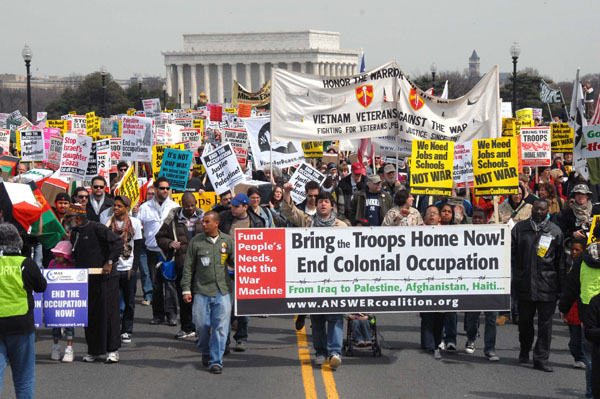WAR and glass abattoirs - the "demeritocracy-loyalty" theory
OK, so the press played dumb. Did they really? I think not. I think it is impossible that so many outlets sang the same song unless there was something VERY powerful to make them. I don't believe in the "demeritocracy-loyalty" theory.
The "glass abattoirs" meme is nice.

World painted in blood ...
Chilcot Inquiry: The Establishment Goes To Work (Part 2)
by MediaLens / December 17th, 2009
Buckling Under Bush
In an early leading article on the Chilcot inquiry, the Guardian observed:
“What is already clear from the first week alone is that the decisions, secret or otherwise, that led to war were the product of systemic failure. Intelligence analysts, diplomats, in fact the entire machinery of the British government, proved supine against Washington’s will. Under that pressure, almost everyone buckled.”1
They certainly did. The Guardian’s Martin Woollacott wrote in January 24, 2003:
“Among those knowledgeable about Iraq there are few, if any, who believe he is not hiding such weapons. It is a given.”2
This was close to being an exact reversal of the truth. Hans Blix, former head of UNMOVIC arms inspections in Iraq (November 2002-March 2003), said in June 2003:
“If anyone had cared… to study what UNSCOM [arms inspections in Iraq from 1991-1998] was saying for quite a number of years, and what we [UNMOVIC] were saying, they should not have assumed that they would stumble on weapons.”3

Unfortunately, almost no-one had cared to study anything. Former chief UN weapons inspector, Scott Ritter, put the issue in perspective last month:
As of December 1998, both the U.S. and Britain knew there was no ‘smoking gun’ in Iraq that could prove that Saddam’s government was retaining or reconstituting a WMD capability. Nothing transpired between that time and when the decision was made in 2002 to invade Iraq that fundamentally altered that basic picture.
But having decided on war using WMD as the justification, both the US and Great Britain began the process of fabricating a case after the fact. Lacking new intelligence data on Iraqi WMD, both nations resorted to either recycling old charges that had been disproved by UN inspectors in the past, or fabricating new charges that would not withstand even the most cursory of investigations.
He added:
The evidence needed to undermine any WMD-based case for war, derived from the work of the UN weapons inspectors, was always available to those officials in a position to weigh in on this matter, but either never consulted or deliberately ignored…
But “even the most cursory of investigations” was never attempted. We were amazed in 2002-2003 at the media’s complete lack of interest in testing US-UK government claims. Ritter’s comments above +were+ published in the Guardian, but in 2009, long after they had lost the power to make a difference. In 2003, the Guardian and Observer mentioned Iraq in a total of 12,356 articles. In these articles, Ritter was mentioned 17 times, mostly in passing. The Independent mentioned Ritter eight times in 5,648 articles on Iraq in 2003. Ritter’s claim that Iraq had been “fundamentally disarmed” by December 1998, received fewer than a dozen brief mentions in the Guardian in 2002. Ritter made the point:
“The president’s task was made far easier given the role of useful idiot played by much of the mainstream media in the U.S. and Britain, where reporters and editors alike dutifully repeated both the hyped-up charges levied against Iraq and the false pretensions that a diplomatic solution was being sought.”
Everyone knew that Iraq’s nuclear programme had been completely eliminated by weapons inspectors before December 1998. The only conceivable threat was offered by the prospect of the Iraqi government supplying old battlefield chemical and biological weapons to al Qaeda. But Saddam Hussein was known to be a mortal enemy of al Qaeda, and any retained WMD would long since have become “harmless sludge”, according to credible experts, like Ritter, whose arguments were available from all good booksellers from 2002 onwards (See: Ritter and William Rivers Pitt, War On Iraq, Profile Books, 2002).
The Iraqi “threat” was a fantasy invented by the immensely powerful, nuclear-armed bullies of the West. This is why former British ambassador to Washington, Christopher Meyer, was able to observe last month that prior to the attacks on September 11, 2001, Iraq was merely “a grumbling appendix.”

The extent of media buckling under Bush-Blair propaganda was spectacular. On February 6, 2003, a Guardian leader responded to US Secretary of State Colin Powell’s infamous speech at the UN the previous day:
It is not credible to argue, as Iraq did in its initial reaction to Mr Powell, that it is simply all lies. It may be that some of what he said is unfounded or exaggerated. But not all of it. As we have noted on numerous occasions, Iraq is not cooperating with the UN in the way the world has a right to expect. Mr Powell has reinforced that impression. Saddam, that bloodiest of dictators who has caused so much pain and suffering for so long, is once again recklessly courting the very disaster so many people rightly fear. Iraqi behaviour must change radically and without any more delay.4
But it +was+ credible that it was “simply all lies.” Again, Ritter was on hand to make this clear, although not in the Guardian:
“He just hits you, hits you, hits you with circumstantial evidence, and he confuses people — and he lied, he lied to people, he misled people… The Powell presentation is not evidence… It’s a very confusing presentation. What does it mean? What does it represent? How does it all link up? It doesn’t link up.”5

As we recently noted, the pitiful response of the BBC’s leading interviewer, Jeremy Paxman, was standard for the media:
“I thought, well, ‘We know that Colin Powell is an intelligent, thoughtful man, and a sceptical man. If he believes all this to be the case, then, you know, he’s seen the evidence; I haven’t.’” (See our alert for details)
The Guardian’s insult to the intelligence in the wake of Powell’s “evidence” was completed by its observation that “Iraqi behaviour must change radically and without any more delay.” But by February 2003 the Gulf was packed with hundreds of thousands of troops, hundreds of tanks, and hundreds of ships and planes. It was inconceivable that the US and Britain would simply bring them all home again, regardless of what Iraq did or did not do.
In April 2003, one week after US tanks had captured both Baghdad and the hearts of most British journalists, one of the Guardian’s most senior commentators, the late Hugo Young, wrote of Tony Blair:
“For a political leader, few therapies compare with military victory. For a leader who went to war in the absence of a single political ally who believed in the war as unreservedly as he did, Iraq now looks like vindication on an astounding scale.”6
Young added:
No one can deny that victory happened. The existential fact sweeps aside the prior agonising. That is an inexorable short-term truth about war. Not even the promised shed-loads of chemical and biological weapons seem any longer necessary to make war seem good. For many people, especially those who waged it, its validation becomes very simple. We got rid of a pitiless enemy of humanity. What more do you want? All that agonising about the whys and wherefores? Forget it.
The Guardian’s Simon Hoggart went beyond vindication of Western crimes in an article titled, “Anti-war MPs cling to intellectual life rafts.”


Mocking courageous opponents of the war like MPs George Galloway, Tam Dalyell and Alice Mahon, Hoggart wrote:
“The end of a war is not a time for taking stock, for reflecting on what has been lost and what achieved, but for scrambling on to the intellectual life rafts and hoping for rescue. Tony Blair, for his part, didn’t gloat. He doesn’t do gloating.”7
In its November 23 editorial, the Guardian writes:
“No one disputes that the foreign secretary plotted to ‘work up’ an ultimatum that could trigger war even though he believed that ‘the case was thin’…”
The careful choice of words is interesting. In fact, as Michael Smith’s reports on the leaked Downing Street memo revealed in The Times, the phrase “an ultimatum that could trigger war” should read “an ultimatum +designed+ to trigger war” – infinitely more damning.8
The Guardian continues:
“If, however, the inquiry gets too bogged down in logistical questions it could create the impression that the mission was merely poorly executed, as opposed to being misconceived.”
As ever, the language is carefully chosen to protect Tweedledum and Tweedledee from a public that has woken up to their criminal actions.

Were the terror attacks on September 11, 2001, merely “misconceived”? Or were they crimes, atrocities? Consider the Independent’s remarkable conclusion:
“But in the end, Sir John and his team will be judged on their success in getting answers to a number of crucial questions: What intelligence on the threat posed by Iraq did ministers see and was this evidence deliberately distorted in making the public case for war? Was the door prematurely shut on a diplomatic solution to the crisis?”9 .
But we know the answers to both these questions. The threat of Iraqi WMD was simply invented. It beggars belief that the Independent can still ask if “the door” was “prematurely shut on a diplomatic solution.” We know, without a shred of doubt, that the door to a “diplomatic solution” was never open — “the crisis” was not a real crisis. It was a fiction manufactured precisely +because+ the US-UK governments wanted war; they were determined to invade Iraq.
The “diplomatic solution” was a diplomatic ploy, a sham, a trap. Even now, the Independent cannot bring itself to recognise the ruthless, cynical nature of the political system by which we are governed.
The Glass Abattoir
A Guardian leader observed: “the primary aim of the probe must be to promote the reconciliation of the public with a political class which misled it so badly.”10
The “political class” did the misleading, notice — no mention of the media. A later Guardian editorial comments:
“Neither the US nor Britain has kicked the intervention habit, and the conflict in Iraq is also far from over.”1
Again, the Guardian presents itself as a neutral voice, an impartial observer of the powerful. In fact, as we have seen, it was very much one of the useful idiots to which Ritter referred. It is true that neither the US nor Britain has kicked the intervention habit. But what of the Guardian itself?
In May 2007, a front-page Guardian article declared that Iran was “forging ties with al-Qaida elements and Sunni Arab militias in Iraq in preparation for a summer showdown with coalition forces intended to tip a wavering US Congress into voting for full military withdrawal.”
Juan Cole, Professor of Modern Middle East and South Asian History at the University of Michigan, responded:
US military spokesmen have been trying to push implausible articles about Shiite Iran supporting Sunni insurgents for a couple of years now, and with virtually the sole exception of the New York Times, no one in the journalistic community has taken these wild charges seriously. But The Guardian?11
In September, a Guardian editorial declared:
“Iranian negotiators should realise that their centrifuges are reaching their highest trade-in value. Push it any further, and Iran will not have an internationally monitored production line of enriched uranium to feed its nuclear reactors. Instead of international finance and trade, it will attract blockades and bombs.”12
The Guardian might ask if these are the words of a newspaper that has “kicked the intervention habit”. But a corporate media system can never subject itself to this kind of self-analysis.
True, vanishingly rare, and incomplete, exceptions do appear. In 2004, George Monbiot wrote in the Guardian that “the falsehoods reproduced by the media before the invasion of Iraq were massive and consequential: it is hard to see how Britain could have gone to war if the press had done its job.”13
The media merely “reproduced” falsehoods, then. Similarly, the “job” of the media was assumed +not+ to be the one it performs with such consistency, year after year, for the powerful. Happily, Monbiot’s own newspaper, the Guardian, was among a select group of liberal papers that “were the most sceptical about the claims made by the government and intelligence agencies,” although they “still got some important things wrong.” The appallingly deceptive version of events offered by the pro-war Observer was judged by Monbiot to have been “partly false.” The ugliest truth was not even mentioned — Monbiot talked of media “mistakes,” not “crimes.”
But Monbiot does deserve credit — his article provided a rare discussion of an issue that is normally unmentionable. His comments will have been noted by the powers that be, and not appreciated. Sir Ken Macdonald QC, former Director of Public Prosecutions, recently shone an equally rare light on the subject of thought control in modern Britain:
In British public life, loyalty and service to power can sometimes count for more to insiders than any tricky questions of wider reputation. It’s the regard you are held in by your peers that really counts, so that steadfastness in the face of attack and threatened exposure brings its own rich hierarchy of honour and reward. Disloyalty, on the other hand, means a terrible casting out, a rocky and barren Roman exile that few have the courage to endure.
This helps explain why modern media and politics are such obvious moral and intellectual demeritocracies.
The corporate media concern, quite obviously, is not with examining and declaring the reality of what the organisation is — much less the ugly reality — but the reality of what it needs to +appear+ to be to its customers in order to maximise profits. Expecting honest self-analysis from the Guardian and the Independent is like expecting the meat industry to set up glass abattoirs next to supermarkets. The idea is a logical absurdity, a structural impossibility. Abattoirs +have+ to kill animals out of sight and earshot of consumers. Corporate media +have+ to serve state-corporate power while feigning neutrality. The sham of media neutrality +has+ to be defended by silence — honest, rational analysis is a serious threat.
And so we have the Guardian opining that, in the face of US government propaganda in 2002-2003, “almost everyone buckled.”
The elephant tap dancing across the living room floor, shaking the house to its very foundations, is not even mentioned. This is the role of the media in causing the deaths of more than one million living, breathing, dreaming, suffering human beings. This is the role of a media, which did +not+ merely buckle in helping this happen, but which performed the traditional propaganda service it has been +designed+ to perform in the service of the interests that created it.
The problem is that there can be no fundamental political change so long as the media has the power to stifle discussion and dissent. This is why media protestations that politicians need to be called to account are so cynical, so insulting to the intelligence. The very structure, the very reason for being of the media, ensures that there can be no real change.
Power has to be taken away from the mainstream media. The answer, as ever, lies with ordinary people willing to reject compromise, willing to invest their time, energy and resources in work that prioritises people and planet above profit.
In truth, this path is not at all “rocky and barren”; it does not involve a “terrible casting out.” It is alive with humanity, compassion and creativity. It is the life of meek servility to power and profit that is soulless, miserable and dead.
Read Part 1.
- Leading Article: ‘Iraq inquiry: Dancing to American drums,’ The Guardian, November 28, 2009. [↩] [↩]
- Woollacott, ‘This drive to war is one of the mysteries of our time – We know Saddam is hiding weapons. That isn’t the argument,’ The Guardian, January 24, 2003. [↩]
- Miles Pomper and Paul Kerr, ‘An Interview With Hans Blix,’ Arms Control Today, June 16 2003. [↩]
- Leading article, ‘Powell shoots to kill: But battle over Iraq is far from finished,’ The Guardian, February 6, 2003. [↩]
- ‘Ritter dismisses Powell report,’ Kyodo News, February 7, 2003. [↩]
- Young, ‘So begins Blair’s descent into powerless mediocrity, Victory in Iraq risks being effaced by imminent surrender over the euro,’ The Guardian, April 15, 2003. [↩]
- Hoggart, ‘Anti-war MPs cling to intellectual life rafts,’ The Guardian, April 15, 2003. [↩]
- See Chapter 5 of our book Newspeak, Pluto Press, 2009, for many more examples of media mendacity on this point [↩]
- Leading article, ‘Sir John Chilcot must assert his independence and focus on the key issues,’ The Independent, November 24, 2009 [↩]
- Leading article, ‘Chilcot inquiry: Healing the wounds of war,’ The Guardian, November 23, 2009. [↩]
- Juan Cole, Informed Comment blog, May 22, 2007. [↩]
- Leading article, ‘Iran: Spinning out of control,’ The Guardian, September 25, 2009. [↩]
- Monbiot, ‘Our lies led us into war,’ The Guardian, July 20, 2004 [↩]
 Earth's magnetic field:
Earth's magnetic field:

0 Comments:
Post a Comment
<< Home